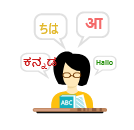 Average score is calculated by totaling the four components divided by four. Few examples:
Average score is calculated by totaling the four components divided by four. Few examples: | IELTS Score Summary | |
| Listening | Difference between IELTS Academic & General Training |
| It consists of 40 questions. 1 mark is awarded for each correct answer. Based on raw scores, a test taker is awarded 1-9 band score. | There is no difference. Because social oriented language skills of listening and speaking are equally important in academic or workplace settings. |
| Reading | |
| The Reading section consists of 40 questions. For each correct answer 1 mark is awarded. A band score ranging from 1 -- 9 is awarded based on raw scores. | Following are the differences between Academic and General Training for the Reading component: a) The texts (topic, genre, discourse type, length, number, etc.). Academic papers source tests are more difficult and complex in style.b) To secure a desired band score. A greater number of questions must be answered correctly on a General Training Reading Testc) The Academic Reading component has more items pitched between 5 -8 band score, whereas in General Training more items are pitched between 3-6. |
| Writing | |
IELTS examiners use detailed assessment criteria known as band descriptors, to award each of the four assessment criteria:
| The IELTS Writing (Academic and General Training) are differentiated according by the tasks (based on topic and genre).This is the case because the difference between Academic and General Training lies basically in the reading and writing components. |
| Speaking | |
In order to award a band in each of the four assessment criteria:
| There is no difference between IELTS Academic and General Training Speaking section as it is important irrespective of a test taker would be in a learning or working environment. |
| Listening | |
| Band score | Raw score out of 40 |
| 5 | 16 |
| 6 | 23 |
| 7 | 30 |
| 8 | 35 |
| Academic Reading | |
| Band score | Raw score out of 40 |
| 5 | 15 |
| 6 | 23 |
| 7 | 30 |
| 8 | 35 |
| General Training Reading | |
| Band score | Raw score out of 40 |
| 4 | 15 |
| 5 | 23 |
| 6 | 30 |
| 7 | 34 |



